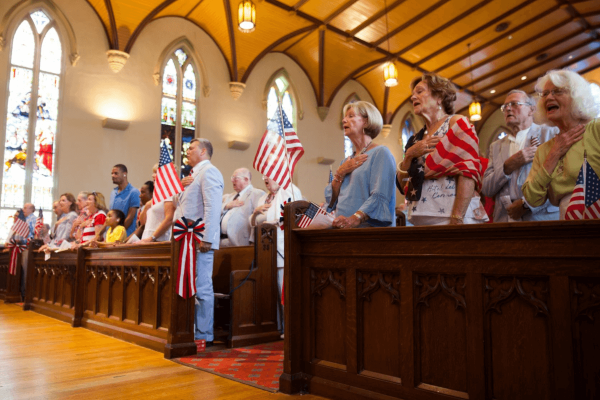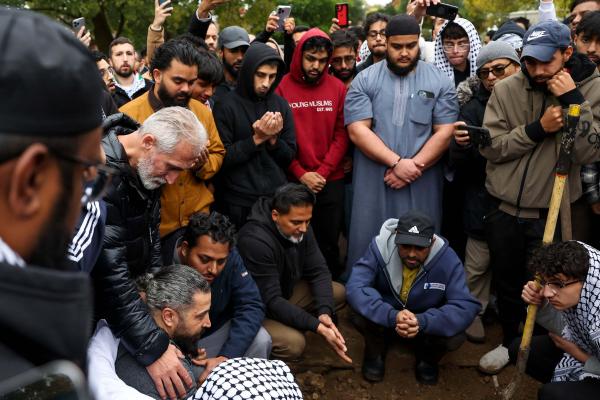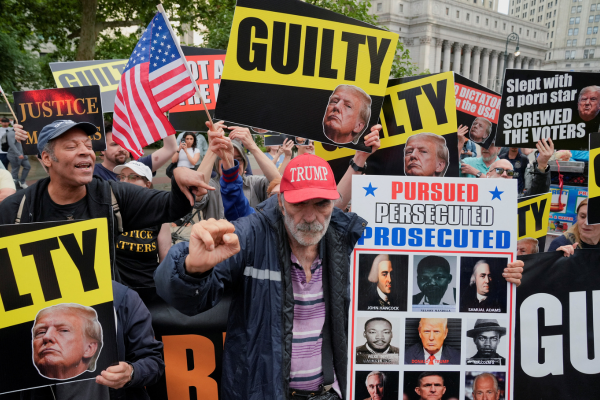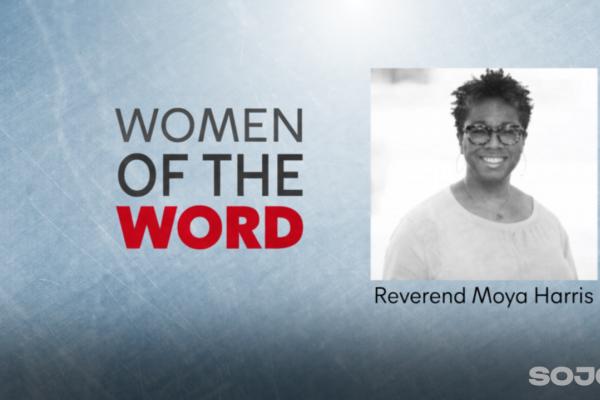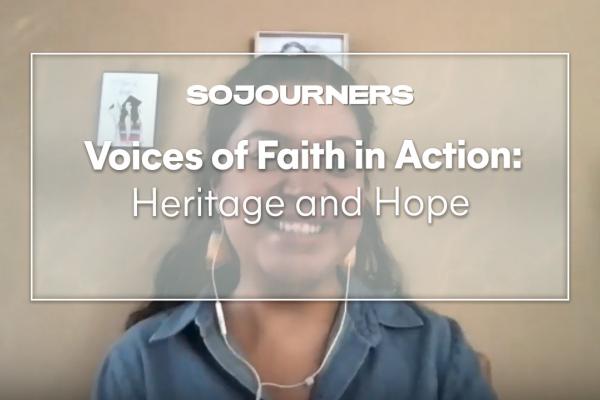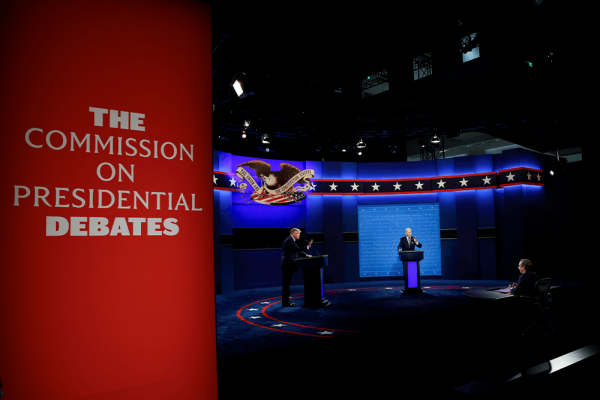This interview is part of The Reconstruct, a weekly newsletter from Sojourners. In a world where so much needs to change, Mitchell Atencio and Josiah R. Daniels interview people who have faith in a new future and are working toward repair. Subscribe here.
At the beginning of their book, Baptizing America, Brian Kaylor and Beau Underwood return to the Christian nationalist display at the U.S. Capitol on Jan. 6, 2022.
No, that’s not a typo. A year after the insurrection, Kaylor and Underwood say Christian nationalism returned to the Capitol, albeit in a less violent and more unassuming way. The two authors, both mainline Protestant ministers, criticized the service hosted by congressional Democrats, where Michael B. Curry — the presiding bishop of the Episcopal Church — offered prayer.
“We need your help, Lord, now, to be the democracy you would have us to be, to be the nation you would have us to be — one nation under God, indivisible, with liberty and justice for all,” Curry prayed.
The service included singing of “My Country ’Tis of Thee,” and “God Bless America.” The event, the authors write, was an example of the way progressives and non-evangelical Christians overlook and even support the blending of Christian and nationalist imagery.
“[The] whole service had included nothing more than two hymns from the Christian Nationalism hymnbook, a prayer from a Christian minister blessing the country as ‘one nation under God,’ and a moment of silence led by a Christian politician,” Kaylor and Underwood write. “If that service had been exactly the same but we switched out the leaders with conservative evangelical figures, it would have quickly been criticized by many as Christian Nationalism.”
In our interview, the authors outline why this moment represents one of the many problems with typecasting Christian nationalism as a problem only for conservative, evangelical Christians. They build the case that the historical scaffolding Christian nationalists rely on was built by mainline Protestants in the 20th century.
This interview has been edited for length and clarity.
Mitchell Atencio:You both acknowledge how important it is to define terms in conversations about Christian nationalism. How do you define it in this book?
Brian Kaylor: We talk about Christian nationalism as being an ideology that fuses and confuses American and Christian identities. That to be a good American, one must be a “good Christian.” And sometimes the reverse is true, that Christian nationalism almost says that to be a good Christian, one has to be a good American, or at least “pro-America.”
Now, as far as the idea of white Christian nationalism, that gets to a really important dynamic. We generally use the term just Christian nationalism. But we also explain that white Christian nationalism is really what’s happening here, because Christian nationalism [in the U.S.] is tied to some very racist ideologies.
Christian nationalism, just like any form of religious nationalism, can be dangerous anywhere. But, if you’re a Christian in Moldova, Christian nationalism can be a threat to your faith, but it’s not that big of a deal. But when you’re a Christian in the world’s empire, Christian nationalism comes with a much more significant heretical feel, because now it’s about supporting and condoning and cheerleading all of the ways of empire.
So, this is a particularly unique threat for those of us in the U.S. today.
I’m going to put a pin in the heresy question. You open the book using Episcopal Bishop Michael Curry as an example of inadvertent Christian nationalism, but you acknowledge that in your own careers you have each been “part of the problem.” Can you give me some examples?
Brian Kaylor: We particularly talk about flags and sanctuaries and the danger of that symbolism and how we’ve been for generations discipling people to fuse American and Christian identities.
We have both pastored churches where the flag has remained there in the sanctuary. There’s particularly a moment a few years ago when I was giving an interview for CBS News talking about Christian nationalism. We’re sitting in the sanctuary of the church where I’m a member and I start talking about the problem of flags in the sanctuary, then I realize that there is a flag literally over my shoulder in the shot. My own church had a flag in the sanctuary.
Beau Underwood: I’ve been in churches where Boy Scout Sunday has been a regular part of our worship, and all of a sudden that “For God and Country” really becomes symbolized or embodied in that service — presenting the colors or saying the Pledge of Allegiance. [“God and Country” is the name of a former religious emblems program in the Boy Scouts of America.]
But I think it’s important to name, and this is where some of the critics of [using the term] “Christian nationalism” get confused: If we take the social science on this topic seriously, which we should, Christian nationalism is a spectrum, it’s not a binary. All of us [support] Christian nationalism to some degree.
Some of the folks who have misunderstood the topic really don’t grasp that. They think you’re either [Christian nationalist] or you’re not, like being a [Chicago] White Sox fan. That’s not how Christian nationalism works. It’s baked into the religious DNA of our country. And the question is: How severe, how intense is one’s Christian nationalism?
Brian Kaylor: To be clear, I’m not a White Sox fan. I’m a [Kansas City] Royals fan.
Beau Underwood: See, that’s a binary where I’m on the right side and Brian’s on the wrong side.
And I’m an [Atlanta] Braves fan when the playoffs come around. Your book is unique in that it is aimed at mainline Protestant Christianity. Why does the history matter? If evangelicals are the strongest supporters of Christian nationalism now, why does the history of mainline Protestant support matter?
Beau Underwood: First, there’s a lot of outrage and anger being directed at evangelicals and more conservative Christians for these intense expressions of Christian nationalism in our public life today. What the history demonstrates is that a lot of the things that we’re castigating evangelicals for doing now, mainliners have done themselves.
Donald Trump’s been criticized for hawking the [God Bless the USA Bible] while he’s been out of office. I find that obscene, but [President] Harry Truman helped legitimate the Revised Standard Version of the Bible. When the National Council of Churches first produced it, they took the very first copy to Harry Truman, there was a Rose Garden ceremony, and he connected the publication of that Bible with the advancement of the U.S.’s foreign policy goals.
Secondly, it’s really important to recognize that a lot of the people advancing this myth of America as a Christian nation, the David Bartons of the world, the data points they draw — such as “under God” in the Pledge of Allegiance — are actually data points created by mainline Protestants.
When they say, “How do we know America is a Christian nation? We put ‘under God’ in the Pledge of Allegiance. We put ‘in God we trust’ as a national motto.” Those things were done by mainline Protestants.
Brian Kaylor: If we really want to make progress on detoxing from Christian nationalism in the U.S., the communities that are ripe for this conversation are those moderate, progressive, mainline congregations. [Especially those that] still have flags in the sanctuary, or God and Country services, or Fourth of July services.
Robert Jeffress, Franklin Graham, and Greg Locke, they’re not gonna listen to us. We still speak out against them because that’s important to offer that public rebuke in a different way of following Jesus. But we do think that there are some congregations that are willing to do the work and that will listen to us and will engage in a conversation.
240617-michaelcurrycn.png
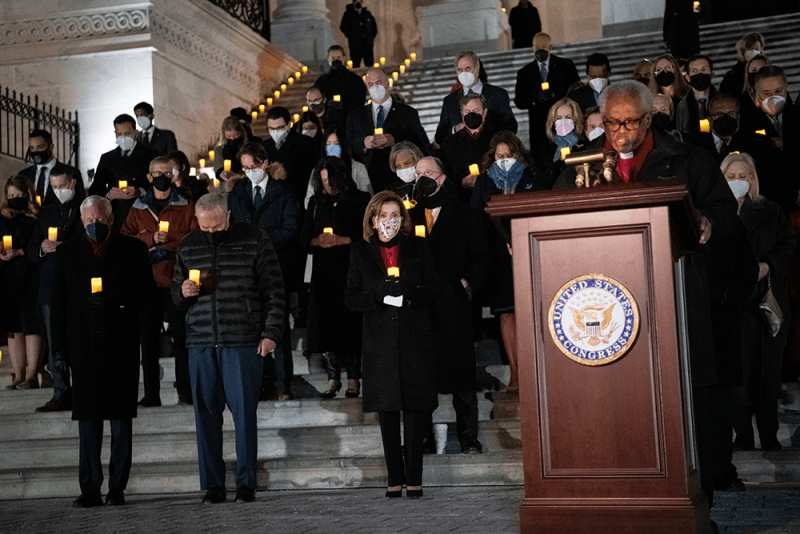
A number of sociologists draw a distinction between religious nationalism and civil religion, with civil religion being a positive expression of religion in politics. Your book seemed critical of civil religion. I found it interesting that you called it a concept of “yesteryear,” and pointed to demographic change in Christian adherents as the reason. So is civil religion something that is bad because we live in a religiously pluralistic society?
Brian Kaylor: It’s worse in a society like ours with a lot of religious pluralism. When Robert Bellah wrote his famous essay on civil religion [in 1967], 92 percent of Americans identified as Christian. And only a couple of percent identified as non-believers or as atheists. So “God language” was pretty unifying. Today it doesn’t work. Civil religion today, in our pluralistic society, looks like Christian nationalism.
But [on the other hand] we were never as hegemonic as it seemed in that era. When we do things that Robert Bellah calls civil religion, like putting God into the Pledge of Allegiance, it was a way of saying to that couple percent [of non-Christians], “You’re not a real American because of what you believe or don’t believe religiously.” Civil religion was never innocent to begin with […] we were excommunicating, civically, a group of Americans because of what they believed. That’s worse today because it’s a larger pile that we excommunicate civically. But it was always harmful and dangerous.
So, if religion is to have a place in public life and not be relegated to the private sphere, what does that look like?
Beau Underwood: This is a real live conversation and concern, though I think it’s overdone, because it presents the idea as either the state embraces and endorses religion or it’s privatized. There’s a lot of room in the middle and the middle is a lot healthier.
[The question is:] What are the Christians engaged in the public sphere looking to do? If they’re looking to have their voices heard and have their views considered and offer reasons they support certain policies or candidates, that’s wonderful and legitimate. If they’re looking to use the power of the state to enforce their particular views on others, that’s anti-democratic.
Most Americans today do not believe that sex outside of marriage is morally wrong. But most Christian colleges have rules against it, and they receive federal funding. Where is that on the continuum of Christian nationalism?
Beau Underwood: This is a live debate, and it applies to religious hospitals, religious schools, and their policies. You’re naming the tough issue.
One, it always depends upon how these programs are structured. If these programs are open to everybody equally and certain religious and secular groups can apply for them, that matters. On the other end, religious schools don’t have to take the federal money. They can choose to operate without it.
There’s been a lot of research showing that the Religious Right arose more formally because of the efforts by the federal government to deny federal funding to [religious] schools that refused to integrate racially. So, we do already have those [anti-discrimination laws] and what we’re struggling with is where to draw the lines [and what to do when] our democratic norms come into conflict with religious groups that don’t embrace democracy.
We honor Rev. Martin Luther King Jr. with a federal holiday. He was clearly a civil leader, but he was also a religious leader. Is that something y’all consider along the Christian nationalism continuum, and is it good or bad?
Brian Kaylor: As you noted, he happened to also be a religious leader. He’s not being honored because he was a religious leader and the holiday is generally, especially at the government level, not framed as religious. He’s honored for his civil rights advocacy. Now, for King, that came from a faith-based perspective, but it didn’t have to.
So, the holiday itself is a good reminder of the difference between Christian nationalism and faith-based advocacy in the public square, because those are different. As we noted, our definition of Christian nationalism wants a narrow slice of Christianity to have special rights and privileges and unique access to power.
King was arguing for all people. He modeled a way of Christian engagement in politics that wasn’t Christian nationalism, and he’s not being honored because he was a minister, although obviously we think that’s a really important part of him that we honor.
Beau Underwood: Somebody asked, “What is the difference between prophetic Christianity and Christian nationalism?” I’ll paraphrase Rev. Adriene Thorne, who wrote the foreword to our book: Prophetic Christianity seeks to expand those who are heard and allowed to flourish in a democracy; Christian nationalism seeks to limit and restrict those who are getting the rights and privileges of state power, influence, and democratic life.
King was calling America to live up to its democratic ideals. Christian nationalism is seeking to undermine those democratic ideals.
This has me wondering where the militant 19th-century abolitionist John Brown fits into this. I ask because I wonder whether your definition of Christian nationalism might sometimes lead us to good or desirable results, whether that’s through John Brown or through your book’s example of President Lyndon B. Johnson compelling Congress to pass the Civil Rights Act.
Brian Kaylor: Christian nationalism can lead to some positive results; it might even lead to some things we agree with. But that doesn’t necessarily mean it’s the right way to do something, especially in a pluralistic democracy.
I could see a moment — not with the current vision of Christian nationalism — but a moment where you have a Christian nationalist vision that is so motivated against the death penalty that they are able to finally end [the death penalty] in the U.S. and doing it on very Christian terms. [Saying stuff like] “You’re a bad Christian if you don’t vote [to end the death penalty].” I would agree with that result of ending the death penalty, but I’m not sure that messaging is healthy for a pluralistic democracy. It would be propping up this Christian nationalism that excludes some people as not good Christians or not good Americans.
When I’ve testified in Missouri legislature on capital punishment legislation, I’m inspired to go and speak out because of my Christian faith, but I don’t expect the lawmakers to vote against the death penalty or limit capital punishment because of the Bible, my Christian faith, or even their Christian faith. I try to make my arguments that, regardless of their religious beliefs, they can see why I think they should support this legislation.
I’m just wondering about the distinction here: If you were a legislator, what would motivate you to vote against the death penalty? And if it’s your faith, is that bad?
Brian Kaylor: It’s bad if my faith motivates me to vote in a way that only helps people of my faith.
Beau Underwood: Whatever your private motivations, are there public reasons you can offer that everybody will accept, based on norms of democracy?
Brian Kaylor: And I don’t want to try to avoid your John Brown question because I find it intriguing. What we see with John Brown is an incredibly problematic model for public advocacy. I want to just come out as against violence and killing those you disagree with.
Brown was a prophetic leader in speaking out against slavery, but his method doesn’t work … John Brown is an interesting vision of a violent, Christian nationalism. And we see in the sociological research that Christian nationalism does have a potency towards violence: “This is God’s will, and if people won’t accept it, we just gotta get it done now.” And that’s really dangerous.
Let’s return to the question of heresy. Why is it important to argue that Christian nationalism is a heresy? Others argue that saying something like “Christian nationalism isn’t Christian” gives Christians a way to abdicate responsibility for Christian harms.
Beau Underwood: To be quite clear, it does not absolve us. We wrote the book because we think mainline and moderate-to-progressive Christians need to look in the mirror on this, because they too perpetuated this heresy.
We call it a heresy because it violates fundamental Christian commitments that are at the heart of our faith and the gospel’s message. It denies that everybody is made in the image of God. It inherently values some people more than other people. It seeks to coerce people in a way that violates the conscience that God gave to them.
When we’re labeling it a heresy, I don’t think you need to confirm one creed or another. I don’t think this is a test of what it means to be orthodox. It’s just there are foundational Christian commitments that are affirmed across multiple traditions and throughout the ages. And [Christian nationalism] fails those.
[Christians] certainly have had other moments of failures. And we’ve come to name and rectify them, and our denominations have come to interrogate themselves and repent and commit to being better going forward. We think there needs to be a similar moment now with Christian nationalism across the whole American church.
Brian Kaylor: When we’re calling it a heresy, we’re saying, “It’s bad enough that we did this. It’s worse that we did it while ignoring what Jesus taught us.”
Got something to say about what you're reading? We value your feedback!
